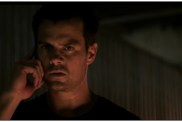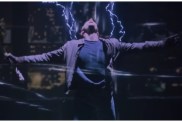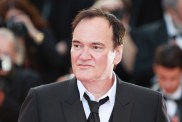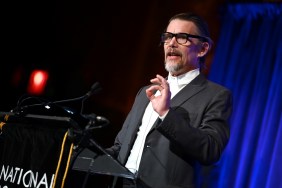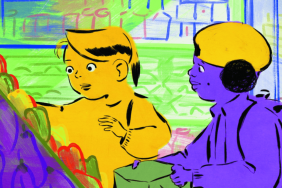Roughly ten years ago, Austin indie filmmaker Richard Linklater and comedian Jack Black came together for the rock comedy School of Rock, which to date, is still Linklater’s most successful movie. (Actually, it’s made more than all his other movies combined.)
Now they’ve reunited for Bernie, a very different movie also based on a real life story, that of Bernie Tiede, a funeral home director in Carthage, Texas, who becomes the close friend and confidante of a rich widow named Marjorie Nugent, played by the legendary Shirley MacLaine. When Marjorie is found dead in an ice chest in her garage after disappearing for nine months, Bernie is the only suspect, but he’s so well-liked among the rural community, it becomes almost impossible for prosecutor Danny Buck (Matthew McConaughey, another returning Linklater vet!) to find a jury to try Bernie in Carthage.
If you’re a Richard Linklater fan (and seriously who isn’t?), Bernie is another shift in direction from his last movie Me and Orson Welles, being darker and drier than some of his other comedies, but Bernie Tiede is another great character for Jack Black, one that allows him to really do some fun stuff, like performing the musical number “76 Trombones” from “Music Man,” and fans of quirky comedies should enjoy it.
Bernie opened in a couple of theaters this past weekend and did well enough that hopefully Millennium Entertainment will be expand it into further theaters over the next couple of weeks, because it would make some great indie counter-programming to all the overrated big-budget summer blockbuster spectacles on the way.
ComingSoon.net: I know this came out of an article you read by Skip Hollandsworth about this widow who’d been found frozen for nine months, so had you guys been wanting to do something together and this just ended up fitting the bill?
Jack Black: We’d been talking about working (together) again, ever since “School of Rock” and then Rick said, “I do have this script that I’d been working on. Check it out and see if you’d been interested in doing it.” I read it, and I called him the next day and said, “I’m in. Let’s make this thing.” It was simple as that really.
CS: Rick, did you have a chance to spend any time with Bernie while developing the script?
Richard Linklater: I had attended the trial and kind of studied it, but I hadn’t met him. I had corresponded with him a little bit once it looked like the movie might be happening, but the real key was when Jack wanted to meet him. We went and hung out with him one morning for a couple hours. It was really great. We got a lot of access to his life and the life he’s made for himself in prison, and I felt a lot better about Bernie after that. It you could just imagine the worst kind of prison life, and just to see that Bernie brought his own kind of niceness to a pretty crappy environment makes it a little better for everybody. He really does spend his time in the craft shop, making these memorials. He teaches, he sings in church. He’s made a lot for himself.
Black: It was nice to see that the script was accurate in its portrayal of how nice a guy he is. It would’ve been harder if we had gotten to the prison and realized, “He’s just a serial killer.” (laughs)
Linklater: Or he’s a psychopath. (laughs) He confirmed the take that the script did.
CS: Jack, what are the things you wanted to know from Bernie when you first met him? And how much time did you actually spend with him?
Black: Well, we walked around for a while, looking at the workshops and his actual cell and meeting some of his friends in there, but we actually sat down with him in a room, just to talk for 45 minutes. I really just wanted to hear his voice, hear his accent, see his walk and his behavior. I had a few questions I wanted to ask about his relationship with Marjorie and what kept him there. Why didn’t he just leave when the relationship turned sour? I also wanted just to know about his life, to get some hits about who he was, his childhood, and what life was like during the trial in a sense.
CS: So just that 45 minutes with him and the script was all you used to create the character?
Black: Yeah, I mean, I had a lot of video tape that Rick had gotten his hands on, that I could study as well and that was very helpful, because he was a public figure. He was leading congregations and ceremonies and it was there and available to watch.
Linklater: There were recordings of him singing, too, but we were with Bernie for a couple hours. The sit-down interview was 45 minutes to an hour or something, but we spent a lot of social time with him also. Because of Jack, we were able to get a lot of access that was really special.
CS: I’m sure a lot of people who watch this movie without knowing the story will assume it’s all made up so it’s pretty amazing when you see that photo of Bernie and Jack together, and you go, “Wow, he’s really a real person.” You don’t get that chance often with these movies.
Linklater: Yeah, usually you’re making a movie that’s based on true life, usually they’re gone or it’s an older story and they’re no longer alive. It’s very rare when you have a chance for your lead actor to occupy the frame with the real person.

CS: When I rewatched the movie, I was surprised by how complex it is and how much is involved with creating this character, from doing full-scale stage musical performances, to the funerals Bernie presides over. There’s really a lot going on.
Linklater: Yeah, well Bernie leads a pretty amazing life. He’s a very involved guy in the community, in the music theater, in his job, in his social life, so to depict that, it takes you in a lot of places.
CS: How did you deal with the type of artistic license often necessary when translating a true story into an entertaining movie while still keeping it true and accurate to what happened?
Linklater: I think that’s what intrigued me about this story. I didn’t really have to do any of that. Everything that happens in the movie – seriously, there’s nothing you can point to and say, “That didn’t happen. That wasn’t part of his life or their relationship.” It’s really close to the public record, to the life they were living, so I dunno, it didn’t need much embellishment.
CS: Jack, was this the first time you’ve played a real person and had this degree of research and preparation to do?
Black: Yeah, this is it. This is the first time. No, there was another one. I did a birdwatching movie, and that was based loosely on a birdwatcher, so I did a couple in succession.
CS: Was that interesting to you as an actor to play a role where you have to embody an actual person who existed?
Black: You could also say that “Nacho Libre” was loosely based on an actual wrestler, but you know what? I’m not going to say that. That was too loose. (At this point, Rick and Jack start laughing and riffing back and forth on this joke, and it’s impossible to transcribe the mayhem.)
CS: Actually “School of Rock” was too, so basically, every movie you’ve done is based on a real person.
Black: That’s right, but no, I wasn’t actively looking for someone to portray, but it was a really neat challenge. It was a cool challenge.
CS: Okay, let’s talk about Shirley MacLaine because she’s a force of nature and just a legendary actress, so what was it like acting opposite her or directing her, just working with her in general?
Linklater: Can I start by saying that I always had her in mind even when the script first came together in the late ’90s? I hadn’t met Jack yet, but I did think about Shirley at that time, and I think she would’ve been too young for the part, as would Jack and Matthew actually. I got really lucky that all these years later, she was available and even wanted to be in this, because she was always my first thinking for that part. There’s really no one else like her.
Black: She really is a force to be reckoned with. She’s got this legendary status that sort of follows her around, and luckily for me, she put me at ease right away and I didn’t have to deal with that intimidating power that she could wield if she wanted to. She was super-complimentary to me and that sort of melted my fears away and we just had fun.
Linklater: You know, Jack kept her laughing. I think she really had fun because she just had fun working with Jack.
Black: Yeah, the thing about Shirley and her approach to Marjorie is that it was important to her that she be three-dimensional. She said early on, “I don’t want to play this like Nurse Ratchett.” People are going to be on my side. She didn’t want to play Marjorie like a monster, she was like a hard-ass.
Linklater: She even said at one point, “People are going to relate to me ’cause I’m not a kiss-ass.”
Black: (going into his Shirley MacLaine impression) “Yeah, all these people in this village are a bunch of gossips.”
Linklater: (not trying as hard at doing a Shirley MacLaine impression) “I’m the only one who’s like real, who doesn’t give a sh*t about all this bullsh*t that everybody else does.”
Black: And I think that added a great dimension to the movie, too, because that’s the way she should approach it, yeah. That’s the way Miss Nugent would want herself portrayed.
Linklater: Yeah, even though the rest of the world does in fact think you’re a b*tch, that’s who you are.
CS: What’s funny is that you surround her in the movie with all these testimonials from people basically saying what a b*tch she was and she deserved to die, which is kind of funny.
Linklater: Well, I don’t know about the “deserved to die” (part). I think they understood it or probably didn’t care, but I don’t know if anyone says, she DESERVES to die.

CS: I liked those testimonials a lot and it’s a big part of why the movie’s so funny, so did you go to Carthage and talk to people about her and do you have any actual Carthage people in the movie talking about her?
Linklater: Yeah, those are mostly people from Carthage and the surrounding area, that’s where we cast. We were looking for people from the area to participate in the movie. There are some actors in there, but there are people in there who cut Miss Nugent’s hair and traveled with Bernie and Miss Nugent on trips, so it’s a mix of all the above.
CS: I also liked the way you had one guy dissect and describe each section of Texas as its own entity and calling it the “People’s Republic of Austin” with “hairy-legged women and fruitcakes.” That must have gotten a huge laugh at South by Southwest.
Linklater: Yeah, yeah, that’s the particular one in Texas, because that’s been my schtick as I describe where I grew up to people, how East Texas is different really from the rest of the State, and how it’s really so big it’s various states, so that was a fun way to depict it. I think the single biggest laugh though comes from the panhandle. When Sonny Carl Davis, that great actor who is playing that guy, when he says, “I left off the panhandle, but I guess most people do” and then he moves on immediately, that gets a big laugh. The panhandle, that’s considered like Oklahoma. Buddy Holly came from there but that’s about it. Noone really thinks about that part of the state much.
CS: Since you’ve been doing press for this together, I’m sure a lot of people have asked about a sequel to “School of Rock.” What exactly happened with the one you were working on and do you think it will ever happen?
Black: We never really agreed on what the script should be. That was the sticking point. We all want to do.
Linklater: We didn’t crack it back then.
Black: Yeah, but at this point, I feel like it would have to be about rescuing rock in a way. The first one was about celebrating it, and about Dewey’s need to fulfill his hunger, but this one would have to be about
Linklater: The phoenix… (laughs)
Black: Yeah, the phoenix rising from the ashes of rock.
Linklater: Speaking of, (Tenacious) D is on tour starting in a few weeks.
CS: Oh, that’s right. So what are you doing next, Richard? I feel like this may have been your longest stretch between movies you’ve done. I didn’t realize this script was something you’d been working on since the ’90s either.
Linklater: It’s one that I’ve been trying to get made for a while. I dunno, man. I don’t know who gets to do that, but I certainly don’t as far as getting my next film made and my next film made. I would have a lot of films if that was the case. It’s hard to get plans to line-up, financing and all, but I’m lucky that I do get to make films and I got to make this one and I got to make all of them really, so I dunno. I’m not complaining and yet, it isn’t fun to just wait around for a couple years when you have a lot of films you’re trying to make. I don’t know what the answer is.
CS: Do you have other screenplays you’ve been developing either before or since “Orson Welles” you want to tackle next?
Linklater: I have like nine projects that I have scripts and things I’m working on that are at least somewhat ready. For every movie, I get two more sort of stacked up, so I dunno, but it’s really satisfying with a film like “Bernie” that I thought about so long ago and sort of nurtured. I realized it was on the burner, but that’s the real test, that gestation time, that there was something at the core of that character and that relationship that never went away, and that tells me that’s worth making, that hopefully an audience member will feel that same kind of complexity or intrigue that I feel if I do it right.
CS: I think some of the best movies end up having that long and infinitely frustrating period of time where it’s just sitting there not moving forward but the end results tend to be better because there’s more time to think about and improve things.
Linklater:Yeah, I think it’s a better movie now than if I made this in the year 2000. I think it’s a better movie for sure.
Bernie is now playing in New York, Los Angeles and Austin and will hopefully open in more areas soon.
